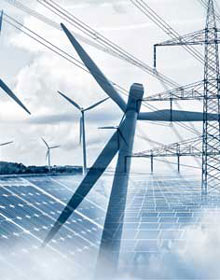
In a concerted effort to stave off power cuts across South Africa, Eskom has increasingly relied on diesel-fueled auxiliary turbines, known as open-cycle gas turbines (OCGTs), following unexpected delays in restoring some of its generation capacity. This strategic move comes after a significant 2,685 megawatts of capacity failed to return to service as planned on September 23, as confirmed by the utility in a recent communication.
The delays have been compounded by unanticipated high electricity demand driven by the last few weeks unexpected cold weather conditions, placing additional strain on the national grid. Eskom's proactive approach in utilizing these auxiliary turbines has been crucial in maintaining electricity supply without resorting to rolling blackouts, a notable achievement given the utility's past challenges with load shedding.
For over six consecutive months, Eskom has managed to prevent rolling blackouts, an accomplishment that has been widely recognized and lauded. However, this operational success has come at a cost. The reliance on OCGTs, which are traditionally intended for use during peak demand periods, has been "extensive," with Eskom utilizing more power from these units in September 2023 than in the corresponding month of the previous year.
Despite the increased usage of these turbines, Eskom has managed to significantly reduce the associated diesel costs. From April to September, the expenditure on diesel to power the turbines was slashed to about a third of the R17.1 billion spent during the same period in 2023. This reduction in costs is a testament to Eskom's efforts to optimize its resources and manage expenses while navigating the challenges posed by capacity delays and heightened demand.

The utility's strategy reflects a delicate balancing act between ensuring an uninterrupted power supply and managing operational costs effectively. As South Africa continues to face energy supply challenges, Eskom's ability to adapt and respond to immediate needs while planning for long-term stability remains a focal point of its operational agenda.
Looking ahead, Eskom's reliance on diesel-fueled turbines raises questions about sustainability and environmental impact. While these units provide a necessary stopgap to prevent power outages, their extensive use underscores the need for a more sustainable and reliable energy infrastructure. The utility has acknowledged these concerns and is reportedly exploring alternative energy solutions to diversify its energy mix and reduce dependency on fossil fuels.
In the interim, Eskom's prompt action to engage the OCGTs has garnered public and governmental support, highlighting the critical role of adaptive strategies in managing national energy security. As the utility continues to address its capacity challenges, stakeholders remain hopeful that ongoing investments in infrastructure upgrades and renewable energy projects will yield long-term benefits.
Eskom's endeavor to balance immediate energy demands with future sustainability goals is reflective of broader global trends in energy management. The situation in South Africa serves as a microcosm of the challenges faced by energy utilities worldwide, emphasizing the importance of innovation and adaptability in the face of evolving energy landscapes.
As Eskom navigates these complex dynamics, the utility remains committed to delivering reliable power to the nation, even as it grapples with the intricacies of capacity restoration and demand management. The road ahead will require continued vigilance and strategic foresight.


20 Comment(s)
Trò chơi phát sóng trực tiếp của họ có chất lượng cao, hình ảnh rõ ràng và âm thanh sống động.
Tôi rất thích các trò chơi trên FB88, luôn có những sự kiện thú vị để tham gia.
FB88 cung cấp trải nghiệm chơi game mượt mà.
Reserve your table now at Barrelhouse Bangalore for an unforgettable dining and nightlife experience! Enjoy craft cocktails, gourmet bites, and live music in a vibrant atmosphere. Perfect for parties, date nights, or casual hangouts. Call or visit our website to book your spot today at Barrelhouse Bangalore.
Office Network Solutions offer businesses reliable, secure, and efficient connectivity across all devices and workstations. They include wired and wireless networks, VPNs, cloud integration, and network management tools. Designed to optimize communication, collaboration, and data flow, these solutions enhance productivity, protect sensitive information, and support smooth day-to-day office operations.
Broadband internet delivers fast, stable connectivity for work, entertainment, and communication. It supports multiple devices, enabling smooth streaming, quick downloads, and reliable online access. With consistent speed and dependable performance, broadband internet enhances productivity and keeps homes and businesses connected to the digital world seamlessly and efficiently.
LG VINA COSMETICS CO., LTD., established in 1997, takes pride in bringing renowned cosmetic brands and premium home and personal care brands to Vietnamese customers. We currently operate in two main categories: Beauty and HDB (Home Care and Daily Beauty). The Beauty category includes products from skincare, cosmetics, and functional food groups, while the HDB category covers products in home care and daily personal care groups. With a vision to become a leading company in the beauty and health industry, we are meticulous at every stage of management to ensure that our products are of the highest quality and meet customer needs.
ISO 17025 certification in Oman ensures that testing and calibration laboratories meet international standards for competence and quality. It demonstrates the ability to produce accurate and reliable results, ensuring consistency in laboratory practices. Achieving ISO 17025 enhances credibility, fosters trust with clients, and supports compliance with regulatory requirements.
Bangalore ISP providers offer a variety of broadband solutions for homes, businesses, and remote workers. With strong network infrastructure and fiber-optic coverage, they ensure fast speeds and stable connections. Customers can select from budget, mid-range, or premium plans based on their internet usage and performance needs.
LiveBet là một nền tảng giải trí trực tuyến sáng tạo, cung cấp cược thể thao trực tiếp và nhiều tính năng tương tác. Dù bạn là fan của bóng đá, bóng rổ hay các giải đấu eSports, LiveBet đều mang đến cho bạn trải nghiệm cược hấp dẫn. Với hệ thống cập nhật tỷ lệ cược nhanh chóng, bạn có thể cược trong suốt trận đấu và tận dụng mọi cơ hội chiến thắng. Các phương thức thanh toán an toàn và dịch vụ khách hàng 24/7 đảm bảo bạn chơi mà không lo lắng. Tham gia LiveBet ngay hôm nay để trải nghiệm cược trực tuyến tiên tiến nhất!
Barrel House on Bannerghatta Road offers a vibrant space for corporate gatherings, accommodating up to 250 guests. It features a full bar, live‑music weekends, and diverse cuisine spanning North Indian, Chinese, and Continental dishes. Packages (₹800–₹1,200 per person) include food and optional alcohol, making it ideal for mid‑sized events.
LiveBet là một nền tảng giải trí trực tuyến sáng tạo, cung cấp cược thể thao trực tiếp và nhiều tính năng tương tác. Dù bạn là fan của bóng đá, bóng rổ hay các giải đấu eSports, LiveBet đều mang đến cho bạn trải nghiệm cược hấp dẫn. Với hệ thống cập nhật tỷ lệ cược nhanh chóng, bạn có thể cược trong suốt trận đấu và tận dụng mọi cơ hội chiến thắng. Các phương thức thanh toán an toàn và dịch vụ khách hàng 24/7 đảm bảo bạn chơi mà không lo lắng. Tham gia LiveBet ngay hôm nay để trải nghiệm cược trực tuyến tiên tiến nhất!
Trường Tiểu học Nguyễn Trung Trực được thành lập năm 1985 có địa chỉ tại 9A Phạm Hồng Thái, phường Nguyễn Trung Trực, quận Ba Đình, Hà Nội (Nay thành phường Trúc Bạch). Trường hoạt động dưới sự quản lý của UBND quận Ba Đình và Phòng Giáo dục và Đào tạo Ba Đình. Trường được xây dựng khang trang trên diện tích hơn 3000 m2 với đủ các phòng học và phòng chức năng cho các hoạt động học tập, vui chơi, giải trí của học sinh.
Địa chỉ: Số 9A Phạm Hồng Thái - Ba Đình - Hà Nội
Email: s666@s666s666s.com
website: Https://s666s666s.com/
Điện thoại: 438261441
Appreciate the detailed breakdown. Definitely a reference post for me.
Project management software development companies in Jordan specialize in creating tailored solutions that streamline task tracking, resource allocation, and team collaboration. These companies support various industries with efficient, scalable tools. Their software enhances productivity and ensures timely project delivery.
Looking to advance your expertise and make a headway in your field? UNICCM offers cutting-edge programs tailored to professionals in contract management, construction, design, and cybersecurity.
For professionals seeking expertise in quantum claims construction, UniCCM’s diploma provides a comprehensive curriculum. It explains how to approach and value claims from a forensic and contractual perspective. With real-world applications and expert instruction, the course strengthens your ability to handle disputes and claims negotiations. Learn on your schedule from anywhere. Build authority in quantum analysis with UniCCM.
ISO 21001 Certification in Dubai is a formal recognition that an educational institution has met the requirements set forth in the ISO 21001 standard. Achieving this Certification demonstrates the organization’s commitment to delivering quality education and continuous improvement in its processes.
The academic ethos of The College of Contract Management is shaped by its focus on contemporary relevance. As part of this philosophy, the professional diploma in digital marketing offers a compressed but substantial exploration of social media, analytics, and digital communication. Guided discussions and live teaching cultivate a reflective understanding of the subject. With its concise learning period, the program ensures progression without unnecessary delay.
UNICCM happily helps you understand the practice and practise difference in a way that feels easy to follow. We enjoy seeing learners grow with refreshingly simple guidance. You’ll feel comfortable asking questions and sharing your thoughts. Our friendly style creates a relaxing space for learning. You deserve an environment that smiles back at you. Come sit with us, learn with us, and build your confidence with us. UNICCM is ready whenever you are.
Choosing the XL7 gives you a practical yet stylish vehicle for various travel needs. Its cabin design ensures comfort even on longer routes. The SUV’s stability and smooth handling make it suitable for any road condition. Families appreciate its versatility and convenience. Experience smooth and stress-free travel with Papimo.
Exploring Wonderful Indonesia opens the door to breathtaking landscapes and unforgettable adventures. From lush jungles to towering mountains, every region offers something unique. The country is rich in culture, wildlife, and natural wonders waiting to be discovered. Trekking enthusiasts will find endless trails filled with beauty and challenge. Begin your journey with Rinjani Trekking Center.
This is one of the most helpful login guides I’ve seen for laser 247.com login. You explained everything in detail without unnecessary complexity.
Very helpful guide on how to create a tiger365 id and why having one is essential to use the platform fully.
Organized Udaipur escort services make bookings simple and quick.
The ICE Professional Review Guidance is an essential document for engineers aiming to achieve Chartered or Incorporated status with the Institution of Civil Engineers. It clearly explains the full review process, including application requirements, written submissions, professional attributes, sponsor roles, and interview preparation. By following this guidance, candidates can understand what assessors expect, prepare strong evidence of competence, and approach the Professional Review with confidence and clarity.
Cricbet99 win updates are often shared by users, which keeps the community active. Such engagement helps build interest among new players.
This article provides helpful insights on escort service in Jaipur.
Leave a Comment